12 Signs You're Eating Too Much Fiber

Fiber is an important part of a healthy diet—but it's possible to overdo it. "High-fiber foods are good for your health," says the Mayo Clinic. "But adding too much fiber too quickly can promote intestinal gas, abdominal bloating, and cramping. Increase fiber in your diet gradually over a few weeks. This allows the natural bacteria in your digestive system to adjust to the change." Here are 12 signs you have too much fiber in your diet.
Bloating
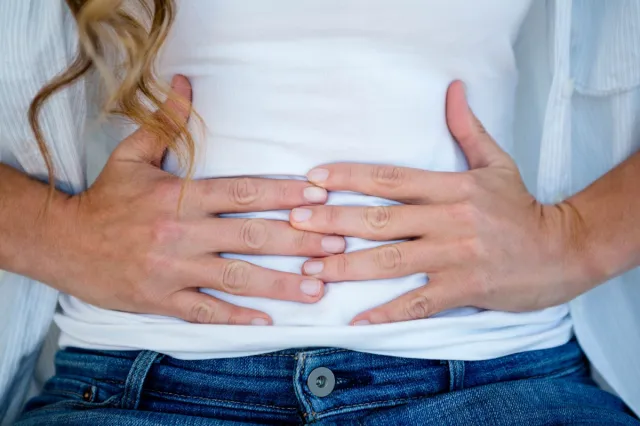
Too much fiber in your diet can cause bloating and discomfort. "If you experience bloating after eating a lot of fiber, it could be because your microbiome isn't used to it," says Taz Bhatia, MD. "A gut with low microbial diversity—or a weaker gut—will struggle to digest the increased dietary fiber."
Gas

Eating too much fiber can cause uncomfortable gas. "Consuming too much fiber can also create uncomfortable symptoms like bloating and excess production of gas," says Eva Selhub, MD. "This most often happens when you eat too much fiber too quickly because most of the fiber won't be digested or broken down while moving through the GI tract. As a result, bacteria that live in the colon digest some of the remaining fiber and create a gas by-product."
Stomach Pain

Too much fiber in your diet can lead to stomach pain. "Along with the change in bowel movements, gas, and bloating, cramping can also occur with too much fiber," says Dr. Selhub. "This results from too much fiber, causing digestion to slow down or stop.
RELATED: 12 Signs You're Eating Too Much Protein
Weight Gain
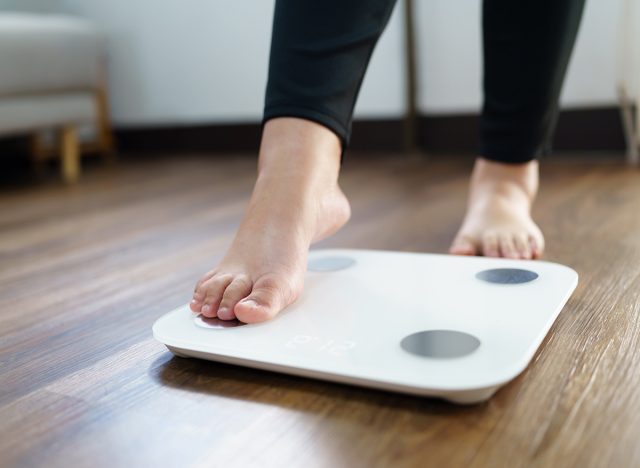
Eating too much fiber can help cause weight gain. Remember, high-fiber foods still have calories, and those calories can add up. Too much of any food can cause weight gain.
Constipation
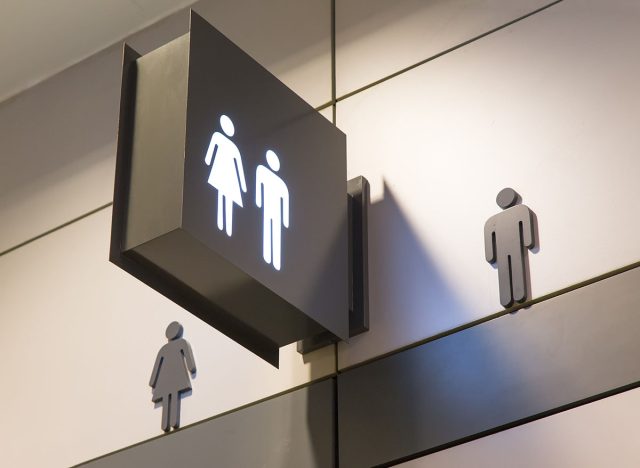
Fiber may actually cause constipation if there's too much in the diet. "Excess fiber can cause constipation or diarrhea," Dr. Selhub said. "Remember to think of fiber as bulk that attracts water in the GI tract. If you don't have enough fluid in your system or you haven't taken in adequate fluids, dehydration of the GI tract can occur, leading to hardening and difficulty passing the stools."
Diarrhea
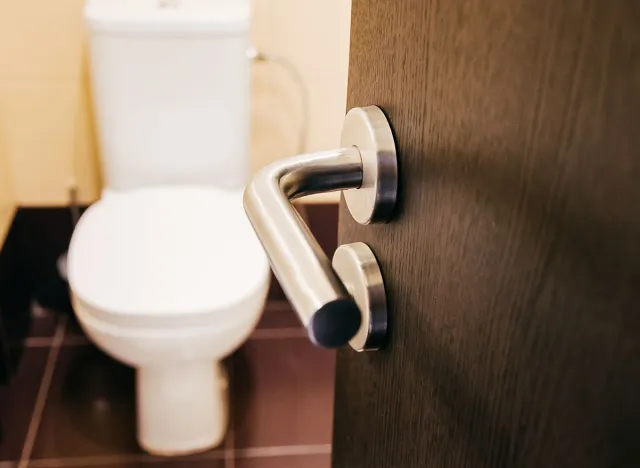
Too much fiber can cause unpleasant diarrhea. "Consuming too much fiber can lead to unpleasant symptoms such as bloating, gas, abdominal discomfort, and even diarrhea," Victoria Whittington, RDN, tells Signos Health. "These symptoms are more likely to occur when there is a sudden and significant increase in fiber intake rather than when fiber is consumed in moderation."
RELATED: 20 Foods for Burning Fat That Experts Swear By
Mineral Deficiencies

Too much fiber can cause mineral deficiencies. "Fiber is a binding agent, meaning it can also bind to nutrients and cause them to be eliminated before the body has a chance to absorb them. This process most commonly affects iron, chromium, copper, zinc, and calcium absorption. According to some studies, it may be possible to offset this by ensuring that you consume adequate amounts of vitamin C and fish or animal protein."
Intestinal Blockage

In rare cases, too much fiber can cause intestinal blockage. In this case, people may choose a low fiber diet for a while. Always talk to a doctor if abdominal pain is severe.
Dehydration

Too much fiber can cause dehydration. "Fiber tends to pull water into our GI tract," wellness dietitian Amanda Beaver tells Houston Methodist. "So, believe or not, consuming a lot of fiber — especially if you're not drinking enough water — can lead to dehydration and an increased chance of constipation."
RELATED: I'm a Doctor and This Is Exactly How to Lose "Serious Weight" with Intermittent Fasting
Nausea

Too much fiber can cause nausea—always check food packaging to make sure you're not getting too much. "Many food manufacturers are adding a lot of fiber to their low-carb or no-sugar products, such as protein bars, powders and shakes, as well as low-carb bread and tortillas," Beaver says. "Fiber is best when it comes how it was packaged by nature. Usually, these foods have more moderate amounts of fiber that are better tolerated."
Feeling Too Full
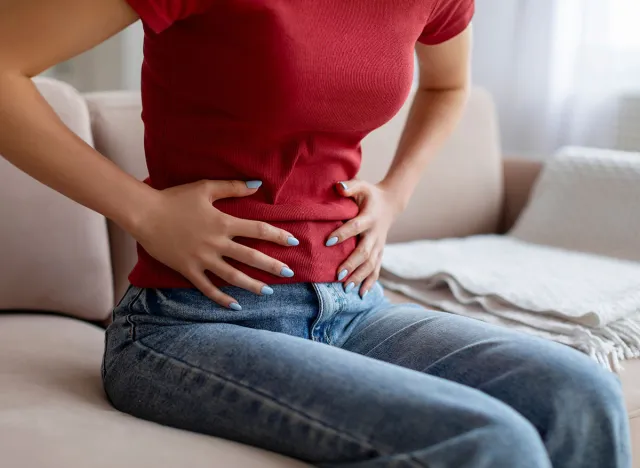
Fiber is filling, which is one of the reasons it's useful in a weight loss diet. However, too much fiber can make you feel uncomfortably full. This is especially likely when combined with gas and bloating.
RELATED: 17 Signs That You May Not be Getting Enough Vitamin D
Adding More Fiber
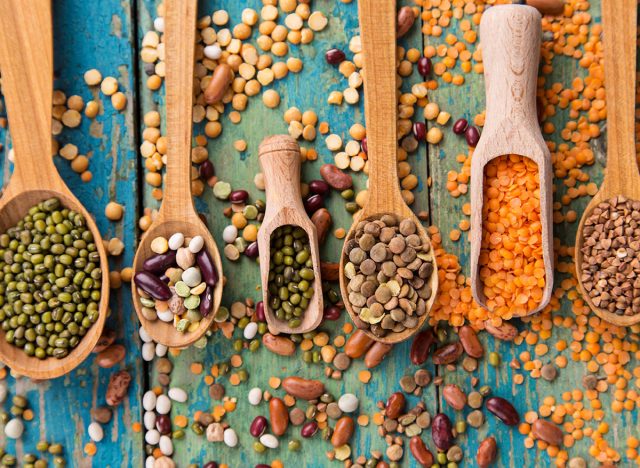
If you want to up the fiber in your diet, do it carefully. "Fiber is an important part of the diet and most people certainly don't get enough," Toby Amidor, MS, RD, CDN, says via Food Network. "However, you also don't want to go overboard and take in too much too quickly! Introducing a variety of fiber-filled foods slowly over time and drinking plenty of water is the trick to taking in fiber with minimum digestive issues."And if you enjoyed this article, take advantage of these 20 Superfoods for People Over 50.




